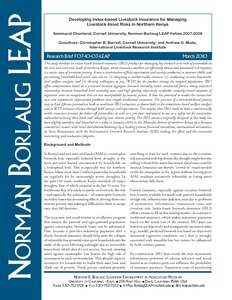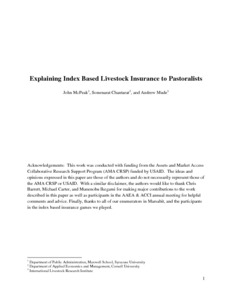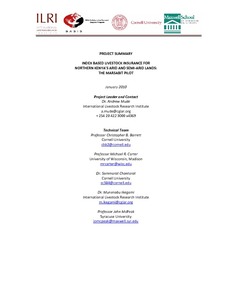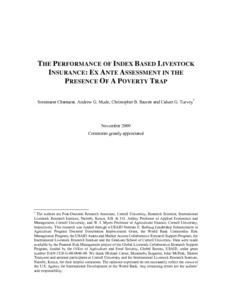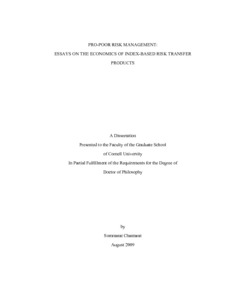Location
Cornell is a privately endowed research university and a partner of the State University of New York. As the federal land-grant institution in New York State, we have a responsibility—unique within the Ivy League—to make contributions in all fields of knowledge in a manner that prioritizes public engagement to help improve the quality of life in our state, the nation, the world.
Members:
Resources
Displaying 16 - 20 of 27Developing Index Based Livestock Insurance for managing livestock asset risks in Northern Kenya
This study develops an index-based livestock insurance (IBLI) product for managing key livestock asset risks of pastoralists in the arid and semi-arid lands of northern Kenya, where insurance markets are effectively absent and uninsured risk exposure is a main cause of persistent poverty.
Explaining index based livestock insurance to pastoralists
Livestock production in arid and semi-arid rangelands is a risky enterprise. Covariate risk of catastrophic livestock loss due to drought is the most critical uninsured risk facing livestock producers. These losses can lead to persistent poverty. We are trying to design an index based livestock insurance (IBLI) program as a viable means to help pastoralists in northern Kenya manage such covariate risk of livestock losses due to drought.
Index based livestock insurance for northern Kenya’s arid and semi-arid lands: the Marsabit Pilot. Project summary
The performance of index based livestock insurance: ex ante assessment in the presence of a poverty trap
This paper evaluates the effectiveness of a new index-based livestock insurance (IBLI)
product designed to compensate for area average predicted livestock mortality loss in
northern Kenya, where previous work has established the presence of poverty traps. We
simulate household-specific wealth dynamics based on a model parameterized using rich
panel and experimental data from the region. The simulations allow us to investigate
patterns of willingness to pay for asset index insurance that is imperfectly correlated with
Pro-poor risk management: essays on the economics of index-based risk transfer products
This dissertation explores innovations in index-based risk transfer products (IBRTPs)
as a means to address an important isurance market failure that leaves many poor and


